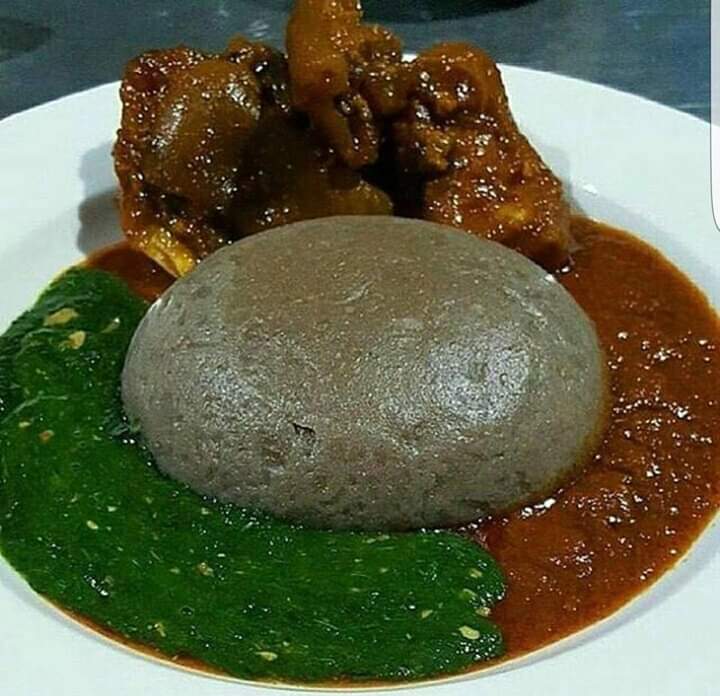Amala and Ewedu holds a special place in the hearts of Nigerians, offering a burst of flavors and a comforting experience. Nigerian cuisine is rich and diverse, with each region offering a unique blend of flavors and ingredients. One such iconic dish is Amala and Ewedu, a delightful combination of yam flour and jute leaf soup. In this post, we’ll guide you through the step-by-step process of preparing this traditional delicacy in the comfort of your own kitchen.
What is Amala and Ewedu made of?
Amala is made from yam flour (Elubo Yam), while Ewedu is made from jute leaves (Ewedu Leaves). Both are staple dishes in Nigerian cuisine, often served together.
How To Make Amala and Ewedu?
Amala Recipes
- 2 cups yam flour (amala)
- Water
- Salt
Ewedu Soup Recipes
- 2 cups jute leaves (ewedu)
- 2 tablespoons ground crayfish
- 2 tablespoons locust beans (iru)
- 2-3 scotch bonnet peppers (atarodo)
- Salt to taste
- Water
- Palm oil (optional)
How To Make Amala and Ewedu
How To Make Amala:
- Boil Water: Start by boiling about 4 cups of water in a pot. Make sure the water is hot but not boiling vigorously.
- Mixing the Amala: In a separate bowl, measure 2 cups of yam flour. Gradually add the yam flour to the hot water while stirring vigorously with a wooden spatula or a fork. This helps prevent lumps from forming.
- Stirring: Continue stirring until the mixture thickens and forms a smooth, stretchy consistency. You can adjust the water or yam flour quantity to achieve your desired thickness.
- Cooking: Once the amala reaches your desired consistency, reduce the heat to low and cover the pot. Allow it to cook for about 5-7 minutes, occasionally stirring to prevent sticking. The amala is ready when it becomes stretchy and gel-like.
- Serving: Remove the pot from heat. Serve the amala in rounded portions on plates.

How To Prepare Ewedu
- Wash and Boil: Thoroughly wash the jute leaves (ewedu) and place them in a pot. Add enough water to cover the leaves and boil until they become tender.
- Blend: Drain the boiled jute leaves and transfer them to a blender. Add scotch bonnet peppers, ground crayfish, and locust beans. Blend until you achieve a smooth consistency, adding a little water if needed.
- Thicken: Return the blended mixture to the pot. Add a pinch of salt and palm oil (if desired) for flavor. Heat the mixture while stirring until it thickens to your preferred consistency.
- Serve: Once the ewedu soup is ready, serve it alongside the amala on plates.
How To Serve Amala And Ewedu
- Amala and ewedu are often served with an array of traditional Nigerian soups like gbegiri (bean soup) and ewuro (bitter leaf soup).
- You can pair this dish with a variety of protein options such as grilled or fried fish, chicken, or assorted meats.
What You Should Know About Amala And Ewedu
- Stir the yam flour into the water gradually to avoid lumps.
- Adjust the thickness of both the amala and ewedu soup according to your preference.
- Palm oil adds an authentic flavor to the ewedu soup, but you can omit it if you prefer a lighter version.
- Experiment with different protein options and side dishes to create a complete and satisfying meal.
What Are The Health Benefit Of Eating Amala And Ewedu?
Amala and Ewedu, like many traditional foods, offer various health benefits when consumed as part of a balanced diet:
What Are The Health Benefit Of Amala
- Rich in Carbohydrates: Amala provides a good source of energy due to its high carbohydrate content, making it a suitable staple food.
- Dietary Fiber: Yam flour contains dietary fiber, which aids in digestion and can help prevent constipation.
- Vitamins and Minerals: It contains essential nutrients like vitamin C, B-vitamins, and potassium.
What Are The Health Benefit Of Ewedu
- Rich in Nutrients: Ewedu is a source of essential vitamins and minerals, including vitamin C, iron, calcium, and potassium.
- Dietary Fiber: The slimy texture of Ewedu can aid in digestion and promote a feeling of fullness.
- Antioxidants: It contains antioxidants that may help protect cells from oxidative stress.
- Potential Anti-inflammatory Properties: Some traditional medicine practitioners believe Ewedu may have anti-inflammatory properties.
However, it’s important to note that the overall health benefits of these dishes can vary depending on how they are prepared and what they are served with. If served with healthy accompaniments and prepared with minimal oil and salt, Amala and Ewedu can be a nutritious addition to your diet.
Conclusion:
Amala and Ewedu is a cherished Nigerian dish that brings together the earthy taste of yam flour with the rich flavors of jute leaf soup. By following this step-by-step guide, you can recreate this traditional delicacy in your own kitchen and savor the essence of Nigerian cuisine. So, roll up your sleeves, gather the ingredients, and embark on a culinary journey that promises a truly authentic dining experience.
